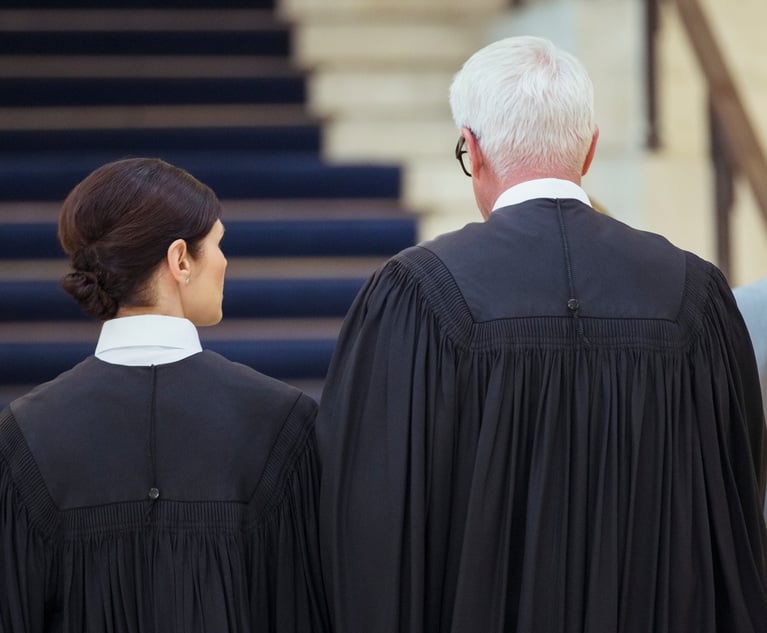Lifetime Achievement: David Aughtry
"I may fall short for many reasons, but lack of effort is not one of them—thanks to the most important lesson learned from greater lawyers."
June 19, 2019 at 02:00 PM
8 minute read
 David Aughtry, Chamberlain Hrdlicka White Williams & Aughtry, Atlanta (Photo: John Disney/ALM)
David Aughtry, Chamberlain Hrdlicka White Williams & Aughtry, Atlanta (Photo: John Disney/ALM)
David Aughtry of Chamberlain, Hrdlicka, White, Williams & Aughtry discovered something about himself after graduating from The Citadel, picking up degrees in law and accounting at the University of South Carolina and earning an LLM in taxation at Emory: “I was born to try tax cases.”
He did just that for the Internal Revenue Service for four years, then crossed over to defending their targets. Many of Aughtry's cases are featured in textbooks and taught in law schools, including his win at the U.S. Supreme Court in Commissioner v. Estate of Hubert. The justices held that a taxpayer does not have to reduce the estate tax deduction for marital or charitable bequests by the amount of the administration expenses that were paid from income generated during administration by assets allocated to those bequests.
He also has won both sides of the same issue, whether a horse can be considered recognized as a deductible business development tool. He won the negative answer while representing the IRS and in 2017 won the positive answer for a client in Topping v. Commissioner.
His other cases of first impression include persuading the Fifth Circuit to erase $380 million in nonprofit penalties and persuading the Tax Court that a family office incurs deductible business expenses, not excluded investment expenses.
What drew you to the tax law?
Obnoxious as it seems now, I wanted to be the governor of South Carolina, knew I needed a lot of money to do that, and, at that time, thought tax law offered one of the most profitable paths. As politics lost its luster, I realized something bizarre about tax: No other area captures the struggle between the federal government and so many of its citizens. No other area touches—and then values—every aspect of our lives, from birth through matrimony, work and charity to retirement and the grave.
No federal agency beyond the IRS (and now perhaps Homeland Security) holds more sensitive personal financial information, carries greater pre-judicial document demand powers and regularly audits more businesses and citizens on a civil basis—with its own criminal investigation division ever present in the background. And for me, no other area offers the confluence between literary persuasion, governmental power and the translation of thought into numbers.
Who were your most important mentors, and what did you learn from them?
While in law school, I clerked for the then 13 lawyers at Nelson Mullins who taught me the importance of setting high standards. In two short months of clerking at Sutherland, giants like Randolph Thrower, Jerry Cohen, Kent Frazier and others taught me one point in very different ways: I lacked their intelligence, and my only hope was to make myself think harder and work harder than I ever expected. My first boss, Preston White, the IRS district counsel, taught me how to try cases and strive through obsessive attention to detail, scholarship and revision to write a brief that sings. I may fall short for many reasons, but lack of effort is not one of them—thanks to the most important lesson learned from greater lawyers.
What is one of your proudest representations?
My one argument before the Supreme Court was certainly the most exciting 30 minutes of my career, the big-dollar cases that threatened family businesses left me feeling I had done something worthwhile, and the occasional public company case of first impression drew some attention. For all their challenges, however, none of those was as important, disillusioning and inspiring to me as the plight of a magistrate judge and his wife.
During the late 1980s, small claims court magistrate judges in Georgia were not required to be lawyers and basically authorized service of process on debtors for local department stores and other vendors. One such businessman turned judge formed a company to handle the process service at the going rate of $20 per service. The government targeted him in an effort to force him to turn on his friend, a prominent state senator. He refused. The government then indicted the judge and his wife on the allegation they had filed a false tax return by not reporting the income and expenses from the process-serving business, as well as other charges.
The judge had wonderful criminal defense counsel, but, to protect his wife against going to jail, he agreed to a plea agreement in which he would serve 21 months on the tax counts and she would serve none. Despite the plea, the district court judge departed upward, sentenced the magistrate to serve 36 months on the tax counts and sentenced his wife to serve 17 months on the tax counts.
We were engaged to defend against the civil fraud case in tax court. The false return plea did not technically operate as collateral estoppel but created a hill to climb. For three days, we tried that case, including offering the testimony of the accountant who documented that the wife gave him the return preparation schedule with the process-serving results, itemized 16 times under the name of the family process-serving proprietorship that bore their initials. The accountant confirmed that he, not the magistrate and his wife, misread the schedule.
The then-chief judge of the tax court concluded from the bench that, as troubled as he was from a judge running a process-serving business, it was not tax fraud. IRS counsel grudgingly agreed and conceded the case (which required tax fraud to keep the limitations period open).
The significance is not the win. The significance is that this man and this woman served time for crimes they did not commit. Everyone wants to believe that the system never fails, but this case proved for me that it can. It also proves that, if we fail to work really hard and fight bias wherever we find it, our aspirations or pretense of justice can turn into something very ugly. What we do as lawyers matters.
What habits do inexperienced lawyers need to adopt to become successful in tax law or legal practice in general?
Paul Getty prescribed the three keys to success. One, rise early. Two, work hard. Three, strike oil. Our best, if not only, shot at striking oil remains rising early, working hard and caring more about our clients than we care about ourselves. In order for us to get anywhere close to a life well spent, we must remember this: We as lawyers were born to serve others. We would like to be well paid for the all-consuming sacrifices the law often demands, but the moment we elevate our own interests over those who have entrusted their problems to us, bad things start to happen.
Be prepared for the strain from that commitment to clients colliding with your marriage, the one stabilizing force in your life. Protect your marriage. Then and only then, recharge your batteries.
Beyond that, I would set goals every morning, revel in scholarship, contract an OCD level of attention to detail, and, for litigators, revise, revise, revise until your brief sings. Just as a thing of beauty may be a joy forever, something ugly will haunt you for the rest of the days of your life. Like our battered heroes in the criminal defense bar, take tough cases that test the rule of law. Finally, find joy in the reality that law remains the most challenging, frustrating and intellectually rewarding walk of life. If you cannot find that joy, find something else to do.
What is a big misconception the public has about taxes and tax law?
The public mistakenly assumes that the IRS is only interested in the correct tax, not the most tax that can be asserted. Not my experience. To be sure, most at the IRS want to do the right thing, but too often campaigns, projects, publicity, zeal and self-serving labels of “abuse” redefine the right thing in the wrong way. Consider the conservation easements encouraged by Congress which the IRS discourages by straining to find technical foot faults to avoid recognizing a penny of the contribution that family made forevermore. How about the small captive insurance companies that Congress encourages small businesses to adopt as a stabilizing protection against business failure? For years, the industry has been begging for guidance on the right way to operate a small captive, but those in charge of that IRS project say they never saw a small captive they liked. They offer no prospective guidance about what is right—only hindsight criticism about what can be second-guessed in order to retroactively ignore the captive altogether.
This content has been archived. It is available through our partners, LexisNexis® and Bloomberg Law.
To view this content, please continue to their sites.
Not a Lexis Subscriber?
Subscribe Now
Not a Bloomberg Law Subscriber?
Subscribe Now
NOT FOR REPRINT
© 2025 ALM Global, LLC, All Rights Reserved. Request academic re-use from www.copyright.com. All other uses, submit a request to [email protected]. For more information visit Asset & Logo Licensing.
You Might Like
View All
Spalding Jurors Return $12M Verdict Against State Farm Insurance Client
10 minute read

Trending Stories
- 1'It's Not Going to Be Pretty': PayPal, Capital One Face Novel Class Actions Over 'Poaching' Commissions Owed Influencers
- 211th Circuit Rejects Trump's Emergency Request as DOJ Prepares to Release Special Counsel's Final Report
- 3Supreme Court Takes Up Challenge to ACA Task Force
- 4'Tragedy of Unspeakable Proportions:' Could Edison, DWP, Face Lawsuits Over LA Wildfires?
- 5Meta Pulls Plug on DEI Programs
Who Got The Work
Michael G. Bongiorno, Andrew Scott Dulberg and Elizabeth E. Driscoll from Wilmer Cutler Pickering Hale and Dorr have stepped in to represent Symbotic Inc., an A.I.-enabled technology platform that focuses on increasing supply chain efficiency, and other defendants in a pending shareholder derivative lawsuit. The case, filed Oct. 2 in Massachusetts District Court by the Brown Law Firm on behalf of Stephen Austen, accuses certain officers and directors of misleading investors in regard to Symbotic's potential for margin growth by failing to disclose that the company was not equipped to timely deploy its systems or manage expenses through project delays. The case, assigned to U.S. District Judge Nathaniel M. Gorton, is 1:24-cv-12522, Austen v. Cohen et al.
Who Got The Work
Edmund Polubinski and Marie Killmond of Davis Polk & Wardwell have entered appearances for data platform software development company MongoDB and other defendants in a pending shareholder derivative lawsuit. The action, filed Oct. 7 in New York Southern District Court by the Brown Law Firm, accuses the company's directors and/or officers of falsely expressing confidence in the company’s restructuring of its sales incentive plan and downplaying the severity of decreases in its upfront commitments. The case is 1:24-cv-07594, Roy v. Ittycheria et al.
Who Got The Work
Amy O. Bruchs and Kurt F. Ellison of Michael Best & Friedrich have entered appearances for Epic Systems Corp. in a pending employment discrimination lawsuit. The suit was filed Sept. 7 in Wisconsin Western District Court by Levine Eisberner LLC and Siri & Glimstad on behalf of a project manager who claims that he was wrongfully terminated after applying for a religious exemption to the defendant's COVID-19 vaccine mandate. The case, assigned to U.S. Magistrate Judge Anita Marie Boor, is 3:24-cv-00630, Secker, Nathan v. Epic Systems Corporation.
Who Got The Work
David X. Sullivan, Thomas J. Finn and Gregory A. Hall from McCarter & English have entered appearances for Sunrun Installation Services in a pending civil rights lawsuit. The complaint was filed Sept. 4 in Connecticut District Court by attorney Robert M. Berke on behalf of former employee George Edward Steins, who was arrested and charged with employing an unregistered home improvement salesperson. The complaint alleges that had Sunrun informed the Connecticut Department of Consumer Protection that the plaintiff's employment had ended in 2017 and that he no longer held Sunrun's home improvement contractor license, he would not have been hit with charges, which were dismissed in May 2024. The case, assigned to U.S. District Judge Jeffrey A. Meyer, is 3:24-cv-01423, Steins v. Sunrun, Inc. et al.
Who Got The Work
Greenberg Traurig shareholder Joshua L. Raskin has entered an appearance for boohoo.com UK Ltd. in a pending patent infringement lawsuit. The suit, filed Sept. 3 in Texas Eastern District Court by Rozier Hardt McDonough on behalf of Alto Dynamics, asserts five patents related to an online shopping platform. The case, assigned to U.S. District Judge Rodney Gilstrap, is 2:24-cv-00719, Alto Dynamics, LLC v. boohoo.com UK Limited.
Featured Firms
Law Offices of Gary Martin Hays & Associates, P.C.
(470) 294-1674
Law Offices of Mark E. Salomone
(857) 444-6468
Smith & Hassler
(713) 739-1250







